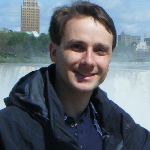
My primary research interests lie at the intersection of two fields: evolutionary computation and multi-agent systems. I am specifically interested in how evolutionary search algorithms can be used to help people understand and analyze agent-based models of complex systems (e.g., flocking birds, traffic jams, or how information diffuses across social networks). My secondary research interests broadly span the areas of artificial life, multi-agent robotics, cognitive/learning science, design of multi-agent modeling environments. I enjoy interdisciplinary research, and in pursuit of the aforementioned topics, I have been involved in application areas from archeology to zoology, from linguistics to marketing, and from urban growth patterns to materials science. I am also very interested in creative approaches to computer science and complex systems education, and have published work on the use of multi-agent simulation as a vehicle for introducing students to computer science.
It is my philosophy that theoretical research should be inspired by real-world problems, and conversely, that theoretical results should inform and enhance practice in the field. Accordingly, I view tool building as a vital practice that is complementary to theoretical and methodological research. Throughout my own work I have contributed to the research community by developing several practical software tools, including BehaviorSearch (http://www.behaviorsearch.org/)
No submitted codebases.
Under development.